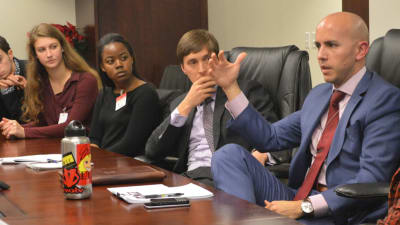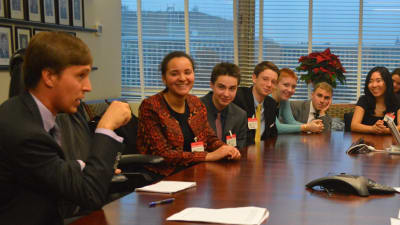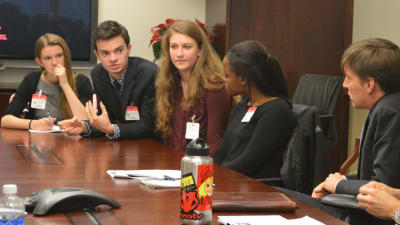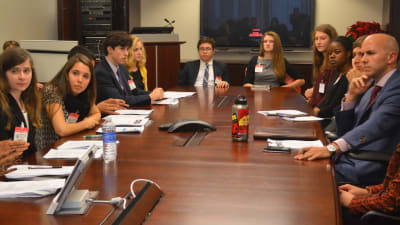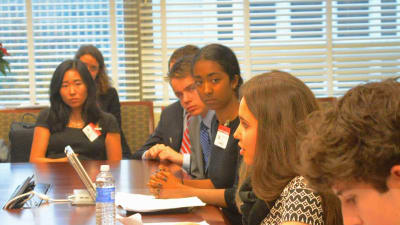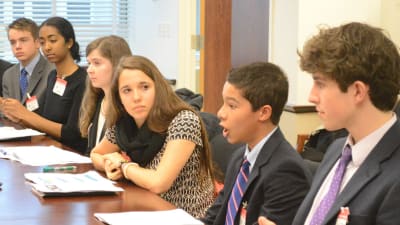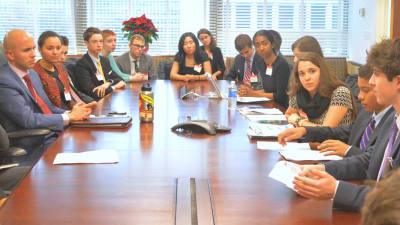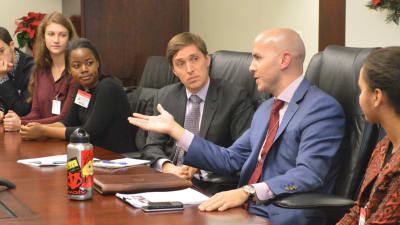Fall 2015 presents capstone policy document at State Department
The capstone collaborative policy document may be SEGL’s most challenging assignment. Each SEGL cohort must select a current international crisis, research that crisis and collaboratively craft a 40-page scholarly document, and then present and defend the document’s recommendations before real-world policymakers. All in about three weeks while also continuing with regular classes.
Our students are always up to the challenge.
This semester chose the ethnic conflict between Dominicans and Haitians (in particular, the current citizenship crisis in the DR) as its topic. After making this decision, the students split into six groups: History/Current Status, NGOs, the U.S. government, the DR government, the Haitian government, and the United Nations. The last five of these groups drafted specific recommendations for their area of specialization.
The groups then spent a day in the George Washington University main library, with full access to the University’s resources. David Ettinger (the top international relations/political science research librarian at GW), who has become a student favorite since our first semester, starts with an entertaining orientation session so that the students know how to use the myriad databases in the GW system, and then the students are off to the many corners of the building.
After compiling their research for several days, the students appear before the notorious “Review Panel” (ask a current student or graduate what the unofficial name for this is), a faculty firing line that blisters the students with tough questions designed to ensure their research is consistent, logical, and well-sourced. (This proves especially useful when the students later present to high-ranking officials.)
The next step is rough drafts (each read by two faculty members), revisions, and additional research. This additional research often includes personal interviews with experts.
And then, before we know it, it is time to present. Each semester we try to meet with on-the-ground policymakers who have the ability to incorporate our students’ ideas into actual policy.
This semester we went to the State Department to meet with two experts. The first, Juan Gonzalez, is Senior Advisor to the Assistant Secretary of State for Western Hemisphere Affairs. Gonzalez had just left his post as Senior Advisor to the Vice President for Western Hemisphere Affairs (he also served as a Staff Director on the National Security Council at the White House), and will soon be the Deputy Assistant Secretary in responsible for the Carribean. The second, Joe Bagga-Taves, is Desk Officer at the State Department: the senior official directly responsible for managing the current crisis in the U.S. Government.
Details of the 90-minute meeting are off-the-record, but both experts were deeply impressed with the students’ preparation, poise, and recommendations. As Gonzalez told them, “When I was your age I was in a Mexico City punk band called ‘Amoebas in Heat.’ You are all far ahead of where I was.” He also all but invited the students to come along the next time he briefed members of Congress on this issue.
The experience was a fitting end to such a major assignment. It also got many students thinking about the benefits of working inside the system versus outside of it. Bagga-Taves noted that though those above him set major policy, he is the “first pen” on every detail and therefore has an important hand in setting the U.S. agenda.
Want to see the document for yourself? You can download it here.
Next week: executive power and our culminating crisis simulation!



